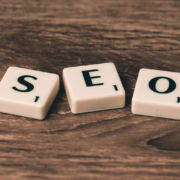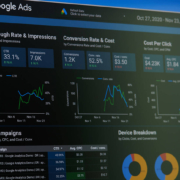Why SEO is Important for Small Business and How to Build the Best Strategy
SEO is important for business.
For big business. For small business. For local business. For ecommerce business. SEO is important for business.
You keep hearing it. But you aren’t sure why SEO is important for business, or what it can do for you. Hell, maybe you’re not even sure what SEO even means.
With how quickly things keep changing, there’s no shame in having questions. And there’s no need to worry, either. We have all the answers you need about SEO strategies and the benefits of SEO to both big and small businesses.
What is Search Engine Optimization?
SEO = Search Engine Optimization. Which means making sure your web page (and business) is designed to place high on the search engine result pages (SERPs). There are a few key ways that small businesses can make sure their web pages are ranking high on the SERPs. We’ll let you in on some of these great SEO tactics later on.
First, let’s make sure we’re on the same page on WHY you want to build SEO strategies into your marketing efforts.
Importance of SEO
The marketing world has changed a lot thanks to advances in technology. The buying cycle has changed dramatically. It’s much easier to reach your target audience, but to capitalize on it you have to make sure your website ranks on the SERPs.
Don’t believe us? Just think about what most people do when they have a question.
Are you hungry for pizza but don’t know what’s close by? Google it.
Thinking of redoing your floors but don’t know where to start? Google it.
Keep hearing about SEO strategies and digital marketing but don’t know what any of it means? What are you gonna do? (We’re willing to bet you did a Google search, didn’t you?)
When your potential customers have a lead generating question, or even when they’re ready to buy, they most likely turn to a search engine. That search engine is likely Google. There are 63,000 search queries on Google every second meaning that there’s more than a fair chance there are potential customers searching for a business just like yours right now.
Benefits of Local SEO
You might think that SEO is only important if you have an ecommerce site or you run a big business. If you’re a small business that mostly operates locally, you may think there’s no need for digital marketing strategies and SEO tactics.
But you’re wrong.
If you’re competitors are using SEO strategies, every time your target audience enters a Google search relevant to your business, you’re missing out on some key benefits of SEO like:
1.Organic Traffic:
Organic traffic means website traffic that you didn’t pay for through advertising. This is a cost-effective way to boost sales. Developing a great SEO strategy leads to higher-placement on the SERPs. Higher-placement on the SERPs leads to more organic traffic to your website.
It can also lead to more organic traffic to your physical store. When people Google your product, they’ll be more likely to find you as a result of a local search thanks to SEO.
2. More Conversions
More organic traffic means more potential customers are finding you. The more potential customers that find you, the higher the number of people who may buy your product.
3. Shortened Buying Cycle
Great SEO can do a lot of the work required to move your potential customers through the sales funnel. When you appear at the top of the SERPs, your potential customers can make the conversion to new customers moments after they Google your product.
4. Builds Trust
People trust search engine results. A lot. Placing high on the SERPs brings the credibility people associate with the search engine to your web pages, and thus your business.
5. Builds Positive User Experience
That trust is well-earned, by the way. Google considers things like authority and positive user experience as a ranking factor. So, if you’re making SEO efforts on your website, it’s bound to also lead to a happier customer.
6. Higher Brand Awareness
The more people who find you, the more people who know about you. Building your online presence and using SEO to boost it can increase your chances of reaching your target audience.
When users have a positive experience they’re likely to share your page with others. Users sharing your web pages on social media can lead to an increase in click throughs from potential customers.
7. Cost-Effective, Long-Term Return on Investment
Good SEO can make an impact on your web traffic without making an impact on your wallet. Once you learn how SEO works and begin using it as part of your digital marketing strategy, you can keep bringing in organic traffic by placing on the first page without having to purchase pay-per-click (PPC) ads.
Once SEO techniques are a part of your web pages, they’re there for good. While it helps to refresh the content, especially when Google search updates its algorithm, good on-site SEO never really goes away.
How SEO Works and Smart SEO Strategies
Now that you know all about the importance of SEO and why SEO is important for business, big and small, let’s get you started on understanding the algorithm and how SEO works.
Google search and other search engine rankings are based on elements known as ranking factors. Relevance to search queries, authority, and user-experience metrics are common ranking factors that determine where your web page ends up on the SERPs — and for your SEO efforts to pay off, you want to end up on the first page at the top of the organic results.
There are a number of SEO tactics you can use to build web pages that will place high on the SERPs.
Keyword Research
Good SEO strategy starts with keyword research. You want to determine what words your target audience is going to use in an organic search. Once you have a list of relevant keywords for your small business, you want to make sure that your web pages include them.
Google search results and other search engine rankings aim to provide relevant content to users. By making sure you’re using these relevant keywords, you’re showing search engines and your target audience that you’re relevant to their search query. Ranking high for as many target keywords as you can will help your chances of landing at the top of multiple SERPs and increase your organic traffic.
Content Marketing
If you want to increase your SERPs placement, then content marketing helps you do so while providing potential customers with high-quality information or entertainment. Regularly publishing content on your web pages that include target keywords can help you rank higher for those search queries.
Some great content marketing strategies include:
-
- Blogging
- Podcasts
- Videos
User Experience
When building your web pages, make sure that page load times are quick and that you are providing a positive user experience. This is important because it will keep your potential customers happy, but it’s also a ranking factor for SERPs. Keeping responsive web page design in mind is key to positive user experience and good SEO strategy.
Google My Business
Now known as Google Business Profile (GBP), this is a free tool you should be using to manage your online presence. If you want to appear in local search results, make sure that you’re using it and that all the information is correct and optimized for Google search.
High-Quality Backlinks and Link Building
To place high on the SERPs, you have to be trustworthy. To be trustworthy, you have to show where you got your info. Having back links to high-authority sites on your webpages will help boost your credibility and build trust both with Google search and your target audience.
Even better, having high-quality websites link to your web pages will build your credibility and increase your clicks. Link building like this is an important element of off-page SEO, and can help spread your brand awareness.
Let Us Lift Your SERPs Ranking
Now you know why SEO is important for business and some SEO tactics that can get your small business moving in the right direction on the SERPs. If you need a more indepth look at how to create positive user experience, increase organic traffic, or conduct keyword research we have plenty of guides on our blog (it’s part of our content marketing strategy).
Or if you’d rather focus on actually running your small business rather than a digital marketing campaign, we get it. SEO efforts take a lot of, well, effort. If keyword research and user metrics are more frustrating than fun to you, reach out to the pros. We’ve got all you need to lead your local SEO strategy.












